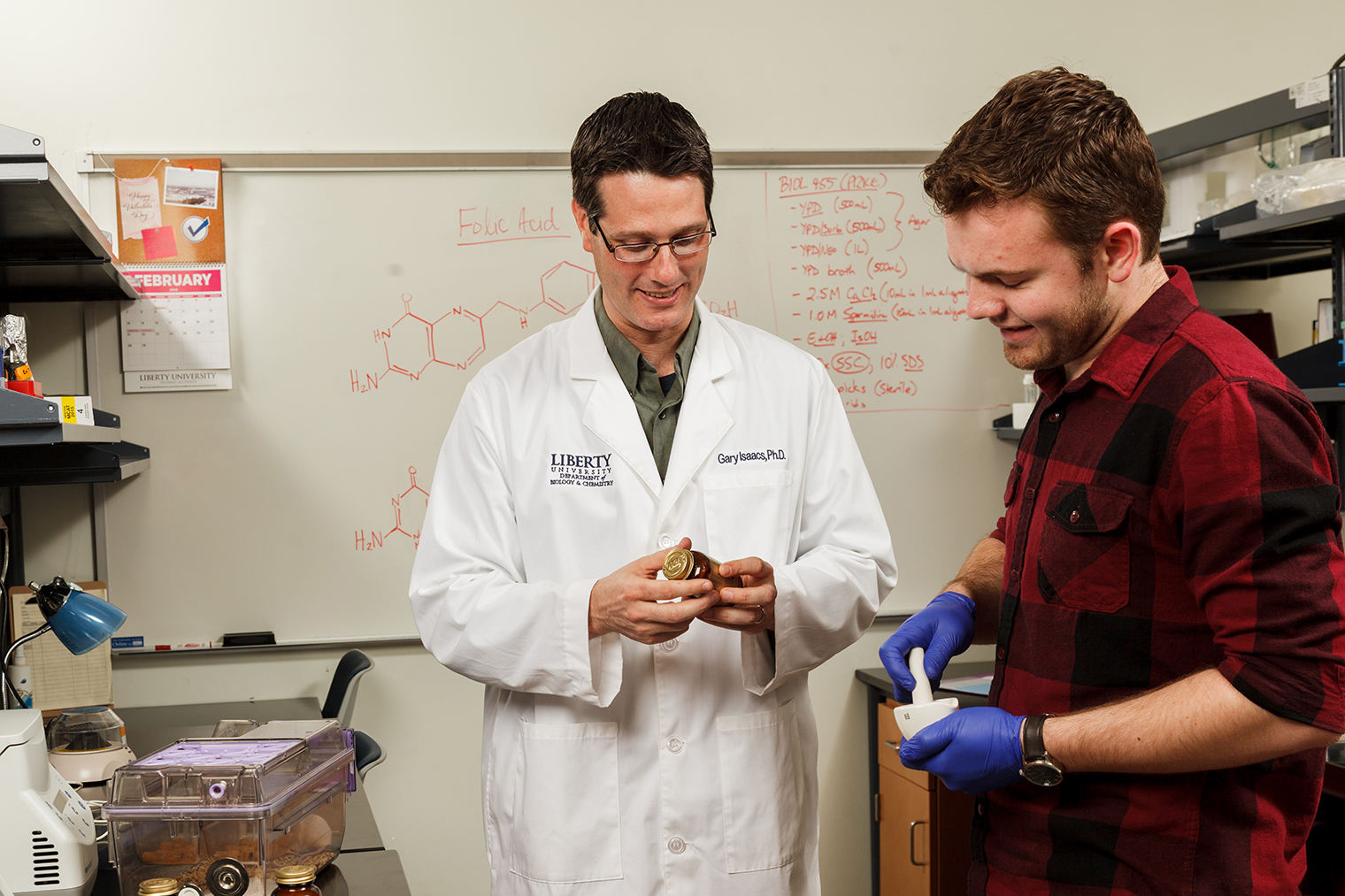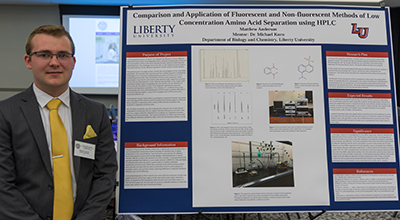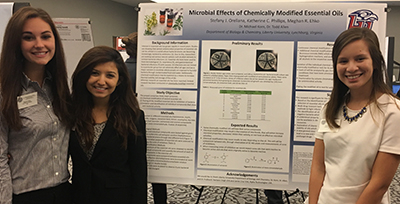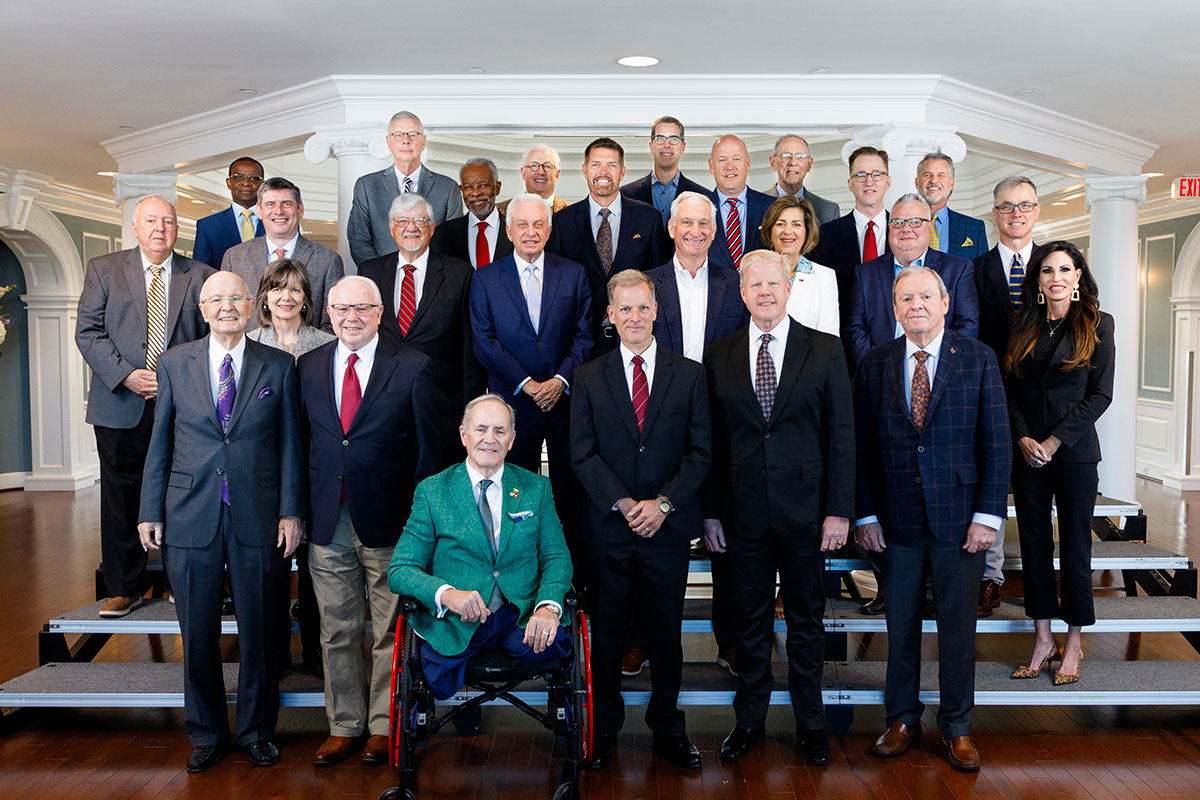Search News Archives
Filter News Articles
Additional Navigation
Students’ research garners grants from Virginia Academy of Science
November 4, 2016 : By Drew Menard - Office of Communications & Public Engagement

Liberty University Department of Biology & Chemistry students won three of the seven research grants awarded at the annual Virginia Academy of Science (VAS) Fall Undergraduate Meeting. Students presented research proposals in poster form, with awards of $500 given to the top pitches. Winners also receive an invitation to present at the VAS Annual Meeting (open to both undergraduate and graduate students) May 17-19, 2017, at Virginia Commonwealth University.
VAS promotes the advancement of science in the Commonwealth by providing financial support for research projects and a platform for the dissemination of research results.
“We are quite honored to see our students recognized for excellence in research,” said Dr. David DeWitt, chair of the Department of Biology & Chemistry. “Competitive awards such as this from the Virginia Academy of Science demonstrate the quality of training that our students receive here at Liberty. Our faculty invest personally in students, and I believe it makes a difference.”
Liberty’s winners were: Junior Christopher Schreiner, under the direction of Associate Biology Professor Dr. Gary Isaacs; senior Matthew Anderson, under the direction of Associate Chemistry Professor Dr. Michael Korn; and the research team of junior Stefany Orellana, senior Katherine Phillips, and senior Meghan Ehko, under the direction of Korn and Director of Chemistry and Associate Professor Dr. Todd Allen.
Schreiner’s research, “Gene Expression Changes Associated with AD and Nutrition,” is part of an ongoing nutritional study on mice. The project compares the difference between mice raised on diets with folic acid and those without, exploring folic acid’s effects on long-term health. Schreiner has been analyzing gene expression (high and low RNA) patterns. Isaacs’ other students, Caleb Schreiner (Christopher’s brother) and Caroline Roberts, are conducting related research. Caleb Schreiner is doing a behavioral study on the mice while Roberts is comparing DNA methylation between various tissues from mice on four different diets. The long-term implications of these studies could provide valuable insight into how diet affects disease progression in humans. It is well known that folate metabolism is important to human health, and an altered folate cycle can affect chemical markers in DNA. Modifications to DNA are associated with birth defects and a number of diseases, including Alzheimer’s disease and cancer.

Isaacs said when students present their research at meetings like the VAS, they realize that the caliber of their work.
“Getting awards is great because it validates the education these students are getting,” he said. “If your professor tells you that you are doing a great job, students could believe you, but when you go somewhere else, and they are giving out seven awards and three of them go to Liberty, that is validation.”
Anderson presented a proposal on “Comparison and Application of Fluorescent and Non-fluorescent Methods of Low Concentration Amino Acid Separation using HPLC,” which compares the efficiency of three different high-performance liquid chromatography (HPLC) methods of separating mixtures that have low concentrations of amino acids. The purpose is to develop the best method of separating and detecting them. Anderson’s project is part of a larger research endeavor at Liberty to re-evaluate the Urey-Miller experiment, which simulates conditions thought to be present on the early Earth and tests the assumed chemical origin of life. His project may result in a new and more effective classroom experiment to contend with the experiment. The larger, ongoing project received an Illuminate Grant in 2013. A new HPLC instrument was acquired by the department to support various research projects by multiple students and faculty members.

Orellana, Phillips, and Ehko’s project, “Microbial Effects of Chemically Modified Essential Oils,” is an example of both student-initiated inquiry and cross-disciplinary collaboration. The students pitched the idea to professors during Research Week last spring, seeking to merge their academic interests and study a trendy topic from a new angle. Orellana is studying biomedical sciences, Phillips is majoring in environmental biology, and Ehko is in the health promotion program with a clinical concentration and biomedical sciences minor. Their project involves the chemical modification of several essential oils, seeking to identify and isolate the individual compounds that show anti-bacterial activity (the active ingredients). This research could provide valuable insight as bacterial strains are becoming increasingly resistant to antibiotics. As essential oils have been used to treat dermatological, respiratory, and gastrointestinal bacterial infections, chemical modification could increase their application.
“I enjoy working on interdisciplinary research topics as this brings about the best of each person’s background,” Korn said. “Having these three students come from three different majors and having other professors contribute with their expertise is very exciting. My desire is that God will be honored through this research.”
Liberty students consistently garner awards and research grants from the VAS. In May, a recent Liberty graduate received the Best Chemistry Poster Award at the VAS Annual Meeting. Last October, Liberty students took home two of the five research grants awarded at the VAS Fall Undergraduate Meeting. Last year, Liberty won its first graduate student award, taking the prize after only one year of having a graduate program in biology.


